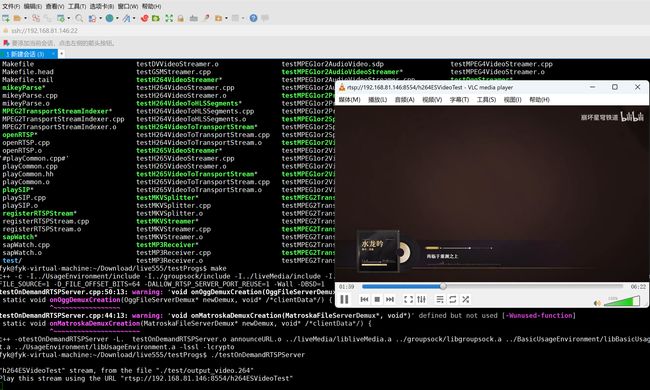live555音视频同步
文章目录
- live555音视频同步
-
- 通过testOnDemandRTSPServer.cpp实现,仅需修改部分代码即可,
- 具体思路:
- 注意
- 具体代码(对testOnDemandRTSPServer.cpp进行修改)
- 修改之后成功在所在目录下直接分步执行以下命令
- 点赞收藏加关注,追求技术不迷路!!!欢迎评论区互动。
live555音视频同步
通过testOnDemandRTSPServer.cpp实现,仅需修改部分代码即可,
具体思路:
流式传输音频+视频很简单:只需调用“addSubsession()”两次 - 一次用于视频源,另一次用于音频源。(这样你的“ServerMediaSession”对象包含两个“ServerMediaSubsession”对象 - 一个用于视频,一个用于音频。)
但是,为了音频/视频同步正常工作,每个源(视频和音频)必须生成正确的“每个帧的“fPresentationTime”值,并且这些“必须”与“挂钟”时间对齐 - 即,与调用“gettimeofday()”时获得的时间相同。
注意
测试用的h264和mp3尽量从同一个mp4上进行提取。以验证同步问题。
提取具体操作:
Mp4文件提取详细H.264和MP3文件_泷fyk的博客-CSDN博客
现成的我已提取好的文件:
音视频同步h264-live555(水龙吟)-直播技术文档类资源-CSDN文库
音视频同步测试mp3-live555(水龙吟)资源-CSDN文库
具体代码(对testOnDemandRTSPServer.cpp进行修改)
#include "liveMedia.hh"
#include "BasicUsageEnvironment.hh"
#include "announceURL.hh"
UsageEnvironment* env;
// To make the second and subsequent client for each stream reuse the same
// input stream as the first client (rather than playing the file from the
// start for each client), change the following "False" to "True":
//单播、组播开关,false为单播,true为组播,单播每个链接接入时都会重新播放,组播的话会随着上一个接入流的位置进行播放
//经过实测,组播模式各链接同步流畅,延迟很小。
Boolean reuseFirstSource = false;
// To stream *only* MPEG-1 or 2 video "I" frames
// (e.g., to reduce network bandwidth),
// change the following "False" to "True":
Boolean iFramesOnly = False;
static void announceStream(RTSPServer* rtspServer, ServerMediaSession* sms,
char const* streamName, char const* inputFileName); // forward
int main(int argc, char** argv) {
// Begin by setting up our usage environment:
TaskScheduler* scheduler = BasicTaskScheduler::createNew();
env = BasicUsageEnvironment::createNew(*scheduler);
UserAuthenticationDatabase* authDB = NULL;
#ifdef ACCESS_CONTROL
// To implement client access control to the RTSP server, do the following:
authDB = new UserAuthenticationDatabase;
authDB->addUserRecord("username1", "password1"); // replace these with real strings
// Repeat the above with each , that you wish to allow
// access to the server.
#endif
// Create the RTSP server:
#ifdef SERVER_USE_TLS
// Serve RTSPS: RTSP over a TLS connection:
RTSPServer* rtspServer = RTSPServer::createNew(*env, 322, authDB);
#else
// Serve regular RTSP (over a TCP connection):
RTSPServer* rtspServer = RTSPServer::createNew(*env, 8554, authDB);
#endif
if (rtspServer == NULL) {
*env << "Failed to create RTSP server: " << env->getResultMsg() << "\n";
exit(1);
}
#ifdef SERVER_USE_TLS
#ifndef STREAM_USING_SRTP
#define STREAM_USING_SRTP True
#endif
rtspServer->setTLSState(PATHNAME_TO_CERTIFICATE_FILE, PATHNAME_TO_PRIVATE_KEY_FILE,
STREAM_USING_SRTP);
#endif
char const* descriptionString
= "Session streamed by \"testOnDemandRTSPServer\"";
// Set up each of the possible streams that can be served by the
// RTSP server. Each such stream is implemented using a
// "ServerMediaSession" object, plus one or more
// "ServerMediaSubsession" objects for each audio/video substream.
// A H.264 video elementary stream:
//在此处进行修改
{
//输出文件名称,按需求修改
char const* streamName = "h264ESVideoTest";
//h264输入文件所在位置,按实际修改
char const* inputFileName = "./test/output_video.264";
//mp3输入文件名称所在位置,按实际修改
char const* inputFileNameAdus = "./test/output_audio.mp3";
//创建ServerMediaSession
//下面这几行定义了两个变量,useADUs 和 interleaving,用于配置MP3音频流的传输方式。useADUs 设置为False 表示不使用ADUs(Audio Data Units),即不进行分组音频数据的传输。interleaving 初始化为NULL,表示不进行数据交错。
ServerMediaSession* sms
= ServerMediaSession::createNew(*env, streamName, streamName,
descriptionString);
Boolean useADUs = False;
Interleaving* interleaving = NULL;
#ifdef STREAM_USING_ADUS
useADUs = True;
#ifdef INTERLEAVE_ADUS
unsigned char interleaveCycle[] = {0,2,1,3}; // or choose your own...
unsigned const interleaveCycleSize
= (sizeof interleaveCycle)/(sizeof (unsigned char));
interleaving = new Interleaving(interleaveCycleSize, interleaveCycle);
#endif
#endif
//添加音频子会话
sms->addSubsession(MP3AudioFileServerMediaSubsession
::createNew(*env, inputFileNameAdus, reuseFirstSource,
useADUs, interleaving));
//添加视频子会话
sms->addSubsession(H264VideoFileServerMediaSubsession
::createNew(*env, inputFileName, reuseFirstSource));
//将创建的ServerMediaSession* sms添加到rtsp服务器。
rtspServer->addServerMediaSession(sms);
//
announceStream(rtspServer, sms, streamName, inputFileName);
}
env->taskScheduler().doEventLoop(); // does not return
return 0; // only to prevent compiler warning
}
static void announceStream(RTSPServer* rtspServer, ServerMediaSession* sms,
char const* streamName, char const* inputFileName) {
UsageEnvironment& env = rtspServer->envir();
env << "\n\"" << streamName << "\" stream, from the file \""
<< inputFileName << "\"\n";
announceURL(rtspServer, sms);
}
修改之后成功在所在目录下直接分步执行以下命令
make
./testOnDemandRTSPServer
windowsVLC接到rtsp流


